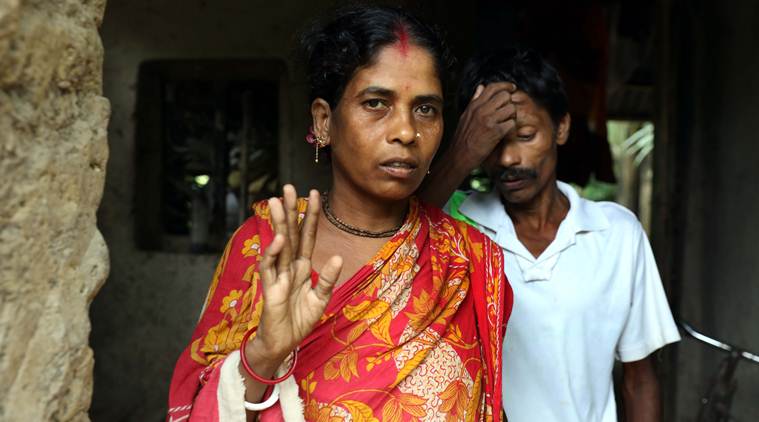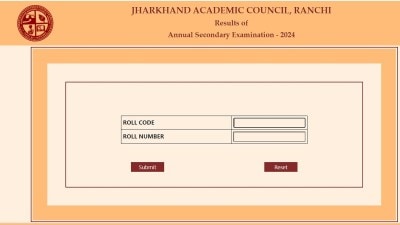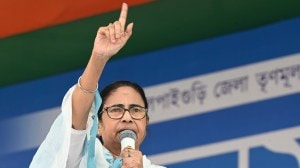- India
- International
In West Bengal, TMC men’s cut money rate list: Rs 200 for last rites, Rs 25,000 for house
The Indian Express spoke to residents in 12 villages across Hooghly, Bardhaman and Birbhum, to find a deep sense of anger and despair at the “system”, which is so well entrenched that there are “fixed rates” for specific schemes, ranging from Rs 200 to Rs 25,000.
 Harekrishna Roy, wife Aloka say they paid Rs 7,000 in cut money for a housing scheme in Berela, Hooghly. (Express Photo: Partha Paul)
Harekrishna Roy, wife Aloka say they paid Rs 7,000 in cut money for a housing scheme in Berela, Hooghly. (Express Photo: Partha Paul)
Last December, Mamoni Sardar paid Rs 550 to a local TMC leader in Hooghly to get an LPG connection under the central government’s Ujjwala scheme. “I thought that was the cost of the connection. I came to know later that I need not have paid any money… I was so angry. Now, I want my money back,” says the 23-year-old.
Today, Mamoni, the wife of a tailor, is among a group of women that has gathered at a mango orchard in Nuniadanga village to vent their anger at two local TMC leaders who, they claim, took Rs 500-600 from each of them to “arrange” their cooking gas connections. The two leaders, Subhas Biswas and Sikha Majumdar, have “gone missing”.
These women and their angry faces represent the backlash in rural Bengal, especially in the districts of Purba Bardhaman, Birbhum, Hooghly, Malda, Murshidabad, Coochbehar and Uttar Dinajpur, against the practice of “cut money”, or illegal commissions, allegedly taken by TMC leaders at the grassroots to “facilitate” the grant of central and state government schemes.
On Tuesday, The Indian Express reported on how the practice, prevalent since the Left rule in the state, has surged after the TMC came to power in 2011. And how people have started demanding refunds from local leaders who were asked last month by Chief Minister Mamata Banerjee to return the money in a bid to bolster the image of her party, which is facing a stiff challenge from the BJP.
The Indian Express spoke to residents in 12 villages across Hooghly, Bardhaman and Birbhum, to find a deep sense of anger and despair at the “system”, which is so well entrenched that there are “fixed rates” for specific schemes, ranging from Rs 200 to Rs 25,000.

Part I | Grassroot TMC leaders face cut-money blowback in Bengal: ‘Can’t return home’
Residents say even families mourning the dead are not spared — for the state government’s Samabyathi scheme, which provides financial assistance of up to Rs 2,000 for the last rites and related expenses, Rs 200 is taken as “cut money”.
And that’s not all. Across these villages, residents and even some Trinamool leaders point to a detailed break-up of “rates” for various schemes. Consider this:
* Ujjwala scheme for LPG connections: Rs 500-600 per beneficiary.
* Banglar Bari (Prime Minister Awas Yojana): Rs 10,000-25,000 per beneficiary for Rs 1.20-1.35 lakh in assistance to build houses.
* Nirmal Bangla (Swachh Bharat Mission-Gramin): Rs 900-2,000 per beneficiary for Rs 12,000 to construct a toilet.
* MGNREGS: Rs 20-40 per day from a job card holder under the rural employment guarantee scheme. The money is totalled and collected by the supervisor once it is received in the beneficiary’s account.
The TMC has maintained that only “0.1 per cent of total public representatives” have “indulged in such activities, and action has been taken against them”. The party has also started a special cell to hear the grievances of people.
At the state-level, its leaders blame the BJP for fuelling the anger. “The BJP is trying to create unrest in West Bengal by staging protests outside the houses of our honest party leaders and public representatives. We will fight this politically,” says Swapan Debnath, senior TMC leader from Bardhaman and MoS Micro Small and Medium Enterprises.
Part III | TMC cornered, BJP takes lead in tracking cut money agents
On the ground, however, these words carry little resonance. “Each scheme has a rate, and a network of local political leaders and panchayat members linked to the system. The system, which existed during the Left Front regime, has now become a full-fledged one,” says a local official in Hooghly.
For instance, residents and Trinamool leaders in Hooghly, Bardhaman and Birbhum underline the “system” in place for MGNREGS.
“It works two ways. For those who have job cards and do the actual work, the amount to be paid to the supervisor ranges from Rs 20-40 per day of the Rs 190 that reaches the beneficiary’s bank account,” says a Trinamool leader, who is also a work supervisor.
“For those who have job cards but are engaged in other professions, or are migrant workers, their names are included in the master roll. On paper, it is shown that they work every day. When they receive the payments, the supervisor takes 60 per cent. I am sure you know there is a chain system, and the party and the panchayat get their cuts, too,” says the supervisor, speaking on condition of anonymity.
According to residents in the three districts, the “system is the same everywhere, only the method of collection varies”. “In some places, the panchayat members directly take the money, but in most places, local TMC leaders and supervisors do the collection,” says the Trinamool leader.
Meanwhile, the complaints continue to pile up.
Listen to Express Audio: TMC’s ‘cut money’ blowback
In Birbhum’s Chhatra village, Kolu Mal is waiting for his toilet to be completed. “I had paid Rs 900 as commission to a local gram panchayat member under the Nirmal Bangla scheme. But it’s still not complete…it doesn’t even have a door and I am using a curtain to save my family from embarrassment,” says the 55-year-old farmer.
In Hooghly’s Berela village, Harekrishna Roy, a farmer, claims to have paid Rs 7,000 to local TMC leader Dhananjay Bala to construct a house under the Banglar Bari scheme. “The leader helped me do all the paperwork. But I had to pay him Rs 5,000 and Rs 2,000 from my first and third installments. I want my money back,” says Roy. Bala could not be reached for comment.
Explaining the “usual method”, Tapas Mal, a farmer from Chhatra, says TMC leaders actively persuade residents to sign up for various schemes.
“For the housing scheme, they help people open bank accounts. Once the accounts are functional, they take four cheques with no amount mentioned from each beneficiary. When the beneficiaries receive their instalments, the leaders deposit the cheques, one after the other. Any amount between Rs 10,000 and Rs 25,000 is taken from each beneficiary. In my case, after the first installment of Rs 45,000 arrived, Rs 5,000 was taken. If we don’t agree, we are told that the next installment won’t come,” says Mal.
Apr 19: Latest News
- 01
- 02
- 03
- 04
- 05






































